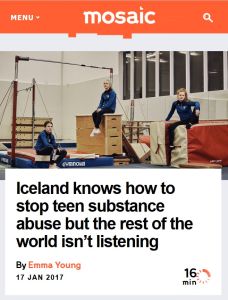Join getAbstract to access the summary!

Join getAbstract to access the summary!
Emma Young
Iceland Knows How to Stop Teen Substance Abuse but the Rest of the World Isn’t Listening
Mosaic, 2017
What's inside?
Iceland has found the key to curbing teen substance abuse, so why aren’t more countries following their lead?
Recommendation
How did Icelandic teens switch from being one of the most substance-abusing populations in Europe to being one of the “cleanest living”? Journalist Emma Young examines how a government-sponsored program called Youth in Iceland evolved, and, ultimately, brought an about-face to Icelandic teen substance abuse. Young offers specific examples of the program’s universal applicability even as she explains why places like the United States probably won’t copy Iceland’s strategies. getAbstract recommends this article to policy makers, parents, teachers and everyone interested finding ways to stop adolescent substance abuse.
Summary
About the Author
Emma Young is an award-winning freelance science and health journalist. She is the author of the book Sane: How I Shaped Up My Mind, Improved My Mental Strength, and Found Calm.
















Comment on this summary